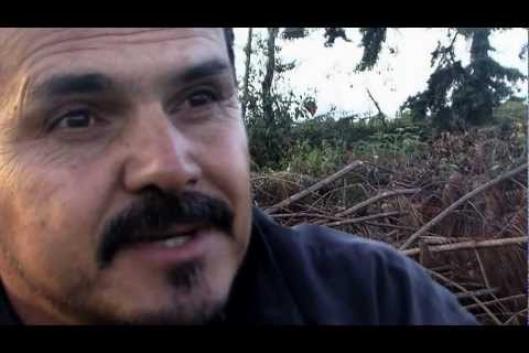This September we pay tribute once again to the men and women around the world who have taken up different struggles against monoculture tree plantations in defense of their territories, their forests and their way of life, as opposed to the greed of big corporations and investors who seek to exploit the same land for their own benefit.
Issue 182 – September 2012
Monoculture tree plantations: challenges, conflicts and resistance
WRM Bulletin
182
September 2012
OUR VIEWPOINT
MONOCULTURE TREE PLANTATIONS: CHALLENGES, CONFLICTS AND RESISTANCE
-
30 September 2012Baby food scandals in Africa, tropical forest destruction for candy bars: There are companies like Nestle that attract scandals like light the flies. On the other hand there are the Teflon-corporations, such as the American Newsweek magazine once called multinational corporations who do basically exactly the same as their competitors, but on which critical allegations do not stick. Unilever is the prototype for this. Unilever is even praised by major international environmental organizations like WWF for its environmental commitment. How can that be, although Unilever is one of the largest palm oil consumers in the world?
-
30 September 2012Problems arising from the social and environmental impacts caused by industrial timber and pulpwood plantations have been well documented over the past 20 years. Now there is ample evidence that the temporary financial benefits generated by monoculture plantation projects which mostly accrue to affluent consumers of their artificially cheap products, the corporate plantation owners and their banks, are heavily outweighed by the costs of their negative environmental and social effects, which are long-term or permanent.
-
30 September 2012Sappi Limited, South African producer of pulp and paper, plans the construction of a biomass combustion plant at Ngodwana Mill, Mpumalanga. It has a proposed capacity of about 50 megawatt, which will supply to the public grid. Misleadingly, this investment is called ‘Green Energy Power Project' (GEPP) – in reality, the power is as green as the inside of the Sappi boiler. According to Sappi, the plant will partly operate using waste products from the pulping process, mostly screening rejects and bark. Currently this material is either burnt in the existing boilers of the mill or dumped. But the majority of the needed biomass – about 390 of 530 thousand tons per annum – will be collected in the surrounding timber plantations and then be transported by trucks to the mill site.
-
30 September 2012Liberia, a small West African country with a population of approximately 3.5 million people, has a predominantly agrarian economy, with high dependency on land and land based resources. The majority of the population lives in rural areas and is engaged in subsistence agriculture and forest-based trade for income generation. Healthcare facilities are poor and in some places non-existent, and the majority of children lack access to safe drinking water. They also lack decent education. The country ranked 182 out of 187 countries on the UNDP Human Development Index in 2011. However, the abundance of fertile farmlands has enabled people in rural Liberia to survive and thrive even in these very difficult circumstances, much to the amazement of outsiders.
-
30 September 2012With an increasing global demand for natural rubber in the past few years, large-scale rubber plantations in Laos are expanding, causing conflicts with local communities in a country where, in early 1990s, it was widely accepted as well as referred by scholars and people who study about Laos that about 80% of the Laos people relied directly on the forest – including the river - for their physical, cultural and spiritual well-being.
-
30 September 2012Timber Plantation concessions are a model of forest exploitation conducted by corporations in Indonesia. More than 9 million hectares of timber plantation concessions have already been awarded by the Ministry of Forestry, though not all of these concessions are used for timber plantations. Up to 2011, less than half of the total area of timber plantation licenses was being managed by the license holder corporation.
-
30 September 2012The area planted with oil palm trees in Brazil used to be relatively small as compared to other countries producing this plant in Latin America. However, big transnational companies in Brazil like Vale and Petrobrás have revealed the rapid expansion of these plantations meant for the production of biofuels, in the Amazon region, mainly in the State of Pará.
-
30 September 2012The results of a research study carried out in different region, in 2010, by the Association of Forest Engineers for Native Forests were published last July. This Independent Forestry Monitoring led to a report on the environmental and social impacts caused by large scale tree plantations established by the company Anchile Ltda., and formal complaints were filed at the National Forestry Corporation (“Corporación Nacional Forestal” – CONAF), a body that is part of the Ministry of Agriculture.
-
30 September 2012The Quebrada de los Cuervos canyon, located in the mountains of the Treinta y Tres District, was the first area to be registered as one of Uruguay's National Protected Areas (2008) for its rich landscape, its biodiversity and because it is representative of native ecosystems. Made up of grasslands, canyon bottom forests, gallery forests and creeks, this area is a biological corridor for a variety of species of flora and fauna.
-
30 September 2012Today, speculative financial markets have gained increasing power over the economy and life, in a response to the capitalist crisis that began in the 1970s. According to data by the financial information group PEI Media Ltd. in the report “Investing in Timberland”, August 2010, among the investment instruments related to nature, timberland investment comprises a diverse range of different asset types: tree plantations established mainly for wood production, forests managed for wood, non-wood products, carbon sequestration, and biodiversity conservation. Assets typically consist of both land and the standing growing stock of trees, but investments can also be made in just one or the other.
PEOPLES IN ACTION
-
30 September 2012On September 21, the International Day against Monoculture Tree Plantations, organizations, networks and movements around the world celebrated the annual resistance campaign that continues to grow every year demanding to stop the expansion of monoculture tree plantations, which threaten the sovereignty of our peoples. Here follow some activities registered by WRM. International
-
30 September 2012On 15 and 16 September, representatives of community networks from northeastern Thailand gathered in Bangkok to protest against the Xayaburi hydropower dam, whose construction on the mainstream of the Mekong River in the territory of Laos is being strongly pushed.
-
30 September 2012The traditional communities known as geraizeiras at the Vale do Guará Settlement, in the town of Rio Pardo de Minas, north of Minas Gerais, denounce that an airplane spraying poison on a major eucalyptus plantation has hit the community, intoxicating 30 people, including children, elderly, youth and adults. They felt nausea, fever, vomit and itching skin. Airplane spraying is increasingly common in Brazil – the world's champion in pesticide use.


